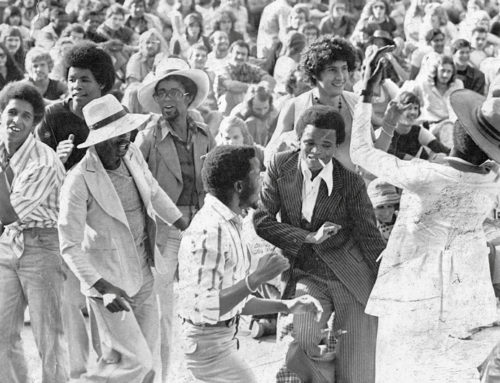 He was a young god at the top of the world. From New York to London billboards featured the Blade Runner in his Flex-Foot Cheetahs – the carbon fibre legs that carried him to international fame. Nike, Clarins, Oakley, Tag Heuer …the leading brands of the world all wanted a piece of Oscar Pistorius and threw millions of dollars at their new icon.
He was a young god at the top of the world. From New York to London billboards featured the Blade Runner in his Flex-Foot Cheetahs – the carbon fibre legs that carried him to international fame. Nike, Clarins, Oakley, Tag Heuer …the leading brands of the world all wanted a piece of Oscar Pistorius and threw millions of dollars at their new icon.
Showered with accessories: sunglasses, watches, fragrances…he needed display cases to house them all. Of course there was one accessory that he could not live without: his prosthetic legs, blades for running and legs for daily use with lifelike feet and toes.
“Since he was little, he had accessories,” his mother Sheila Pistorius, who died when he was 15 years old, once said. “He had to put his legs on like others put their shoes on.”
On his right arm, he has her birth and death dates tattooed in Roman numerals, and on his back, a further memorial, a verse from 1 Corinthians, which begins, “I do not run like a man running aimlessly”.
No one could have foreseen how on that fateful Valentine’s Day, the 14th February 2013, his lifelike legs would be covered in the blood of Reeva Steenkamp. In that instant, his future and fortune froze. In that instant he transformed from a man running to the beat of his phenomenal determination and courage, to a man running aimlessly.
This time a finger pointed to one of his darker accessories, a 9mm Taurus Parabellum self-loading pistol and a magazine full of bullets, with a specific number fired. The bullets were identified as the notorious Winchester Black Talon. Such is the Black Talon’s reputation that it is no longer manufactured by Winchester.
A highly effective expanding, black hollow-point bullet, it causes considerable tissue damage once it breaks skin and drills into the body, mushrooming open and clawing its way through, hence the name Black Talon.
Regarded by the weapon owners’ global subculture as a collector’s item, it is a masterpiece in speed, technology and killing power. Expensive and hard to come by it is something only the rich and brand-conscious can afford.
I am the bullet in the chamber stated that infamous Nike advert featuring the Blade Runner in full flight. No one could have predicted its dark prophecy or associated murder and violence with the handsome, charming Oscar, the darling of the media: the bionic superman who transformed his disability into a sex symbol.
And so we keep asking ourselves was it really culpable homicide or was it murder? Does he have a rage problem? Is he a woman beater? Do cultural and environmental factors, such as the endemic violence in South Africa offer mitigation for his actions? Did he believe he was immortal and could get away with anything?
All these questions roam our hearts and minds as we rewind the tale and trial of this young god fallen, this young man with the world at his prosthetic feet and of a young woman taken out in her prime.
Long after the trial is over, our thoughts and feelings will continue to sway back and forth, partially fuelled by the reality that there isn’t a South African alive who does not have a horror tale to tell.
The crime and violence in South Africa affects us all. It is about a nation that has lost its cornerstones: law, order, the justice system and the police. It is about a nation where far too many people are armed yet you still don’t have the right to shoot when you, your property or family are threatened.
In Texas, if you live on a farm for example, and someone is illegally on your premises, you have the right to shoot to kill. In South Africa, if someone jumps over your electric fence and breaks into your home, and you shoot him in your home, the police will still take you to jail until your bail hearing. If it happens on a Friday you will probably spend the weekend in jail. That’s when you call a good lawyer and make sure you have lots of money in the bank.
So what are you supposed to do under the circumstance?
You are supposed to ask him/her/them to leave your house. Or face going to court.
Once you get to court it is all about how the reasonable person would behave.
The thing is the reasonable person living in South Africa reacts differently to the reasonable person living in the United States or Canada or Dubai.
We are so indoctrinated by fear in South Africa that electric fencing, alarm systems, burglar proofing, vicious dogs and weapons are considered the norm. And if you hear something inside your house, you immediately reach for a weapon or panic button, fearing an attack, whereas in Canada your first thought is that it’s a squirrel or a bear.
There isn’t a South African alive who does not know the sick panic of thinking someone is breaking into their home. Sometimes it’s a cat, sometimes it’s a faulty alarm; sometimes it is an armed robber or attacker.
In Oscar’s case it was none of these, and this is not about defending what he did, but there is no denying that what he did is uncomfortably familiar in South Africa.
It begs the question why we stay in South Africa under such stressful circumstance, even those who have the means or qualifications to leave? Because we are South African. This is our country; it is the place on earth where we feel at home. It is the stuff of which we are made.
Which is why, irrespective of the final judgement in the Oscar case, underlying it is the violence, sadness, bigotry and tragedy that should not be part of our lives, but that infects us all. Another young woman has been lost, another family is in despair and another young man, a tragic hero who overcame so many obstacles to achieve success and fame, has fallen from grace at the pinnacle of his career.
We have all done things that we regret and that will stay with us for the rest of our life. But for Oscar Pistorius it’s compounded. Whatever the outcome of the case and wherever he might find himself – in jail or out of jail – he has to live with what he has done for the rest of his life. All the billboards and brand names have forsaken him and Valentines Day will never be the same.




